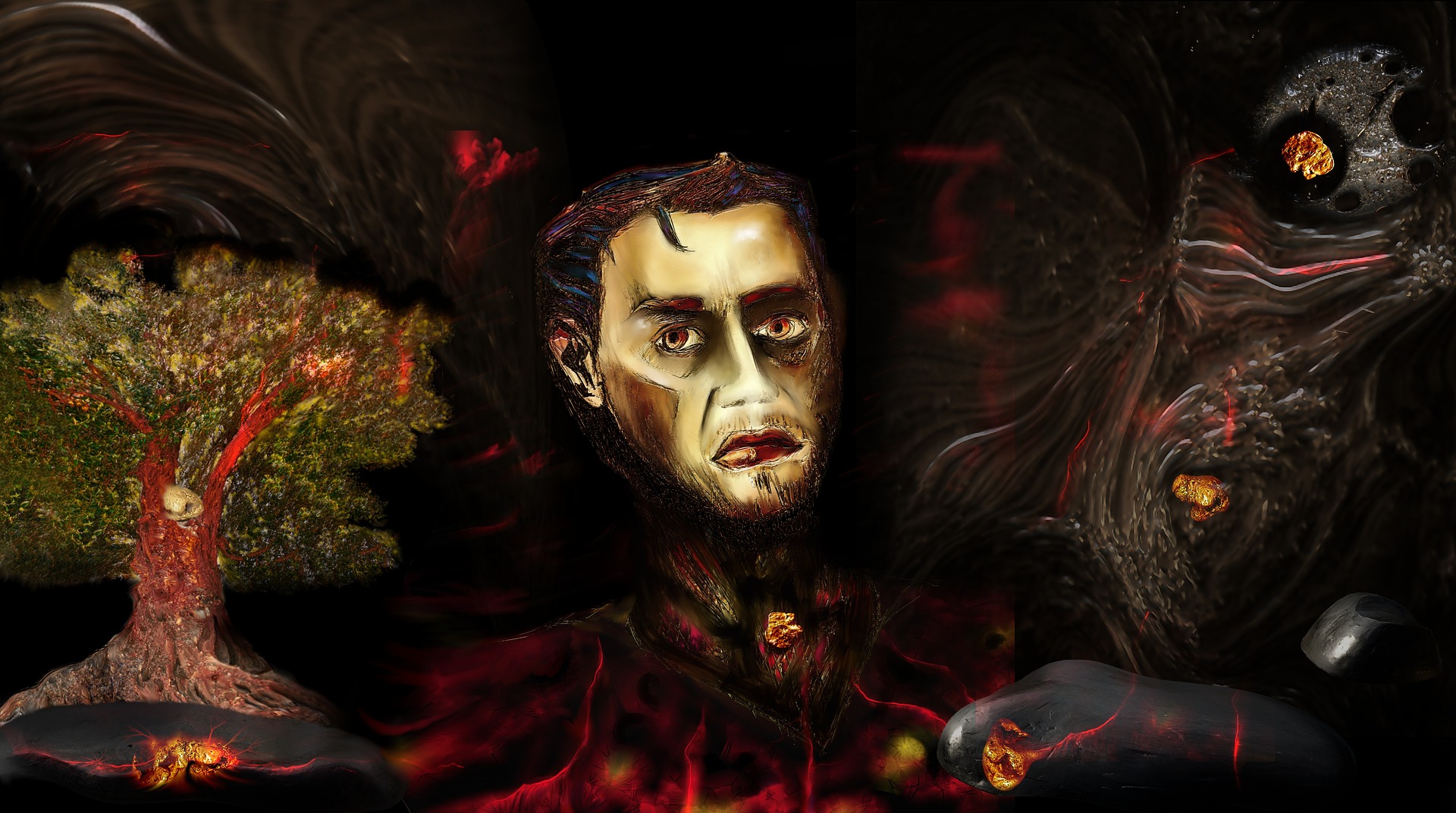
Myths and legends of great and wealthy cities lost or destroyed appear worldwide. A common theme is an excessive pride or ungodly behavior of the rich or ruling classes that eventually invokes divine retribution upon the city. Presented here are three examples of such legends taken from the collection, “Tales of the Lost, The Drowned and the All-Seeing Eye: Vengeance Will Come!” by zteve t evans.
THE DROWNING OF KER-IS
In Breton folklore, a beautiful city named Ker-Is, or Ys, was located in the Bay of Douarnenez, Brittany, France, reaching its zenith during the reign of King Gradlon before disaster struck. Unfortunately, tidal erosion from the sea threatened to drown the city. So the rulers built massive walls around it to keep out the rising water installing great gates giving access and egress between the harbor and the sea. Gradlon wore the key to these gates on a chain around his neck at all times.
He fell in love with Malgven, a beautiful pagan woman who bore him a daughter named Dahut. Shortly after, she told him her time in the world was over and she must leave. However, she insisted Dahut should be well-schooled in pagan ways. Gradlon honored this though he chose to convert to Christianity himself.
Dahut grew up to be as beautiful as her mother and became a high-priestess of the old faith. Gradlon gave her Ker-is to rule but retained the key. She planted beautiful gardens filling them with exotic animals and plants, and the city flourished. One day there came to Ker-is, a mysterious stranger known as the Red Knight who stole Dahut’s heart. On the night of a great storm, to please him, she foolishly stole the key from her father as he slept, and the Red Knight used it to unlock the gates allowing the sea to flood the city.
Gradlon managed to mount a horse and rescue his daughter, but the horse could not carry both of them to safety. As the horse struggled, God spoke to Gradlon, commanding him to throw her into the sea. After initially refusing, he complied and survived.
The old pagan gods rescued their high priestess transforming her into a sea morgen. But, even today, local people and mariners say she is still to encountered sitting on rocks along the wild coastline singing strange songs to lure passing sailors to their doom.
TANNEN-EH: THE CITY ENTOMBED IN SNOW

High in the snowy Alps, there was once a beautiful city named Tannen-Eh whose citizens were honest, hardworking, and god-fearing, living harmoniously with one another and their environment. They fulfilled their basic needs by careful husbandry of agriculture and natural resources. Artisans and those who worked by physical labor were granted as much respect as academics and administrators. The rich happily looked after the poor, who lived in the valley below, who repaid by giving their best service. In this way, for many centuries isolated in the alps, time moved slowly, and Tannen-Eh flourished peacefully untainted by the world beyond.
Outside everything moved faster. Factories churned out toxins contaminating the environment and consuming natural resources ever more quickly and quicker. There was never enough; they wanted more, more, more. Airborne toxins spread far and wide, eventually blighting the pure white snow of Tannen-Eh, but with it came something more frightening. It came slowly, quietly, and unseen, but it was a blight of the worst possible kind. It crept into the human heart, into the very soul, and the people of Tannen-Eh fell victim to it.
The wealthy grew richer, craving ever more frivolous luxuries. The more they brought, the more they wanted. Their wealth increased, and so did their pride, and they regarded the struggling poor with disdain. Putting the poor to work, they built a great tower like that of Babel and in it placed a bell. The bell would ring out for every birth, christening, marriage, or death of the fortunate wealthy ones, but not for the poor who they now regarded as unworthy of acknowledgment or commemoration.
The poor prayed for help, and their prayers went up beyond the tower, beyond the skies, and heard. But, Heaven works in mysterious ways, and there came a great famine, and the poor starved and suffered. The rich locked their treasure in strongrooms, refusing to spend it to alleviate poverty and distress, and many people died of starvation.
In the first days of winter, snowflakes began to fall, gently at first but soon thick and fast. Soon snow rose above the windows, covering the roofs, leaving only the top of the magnificent tower visible. The rich folk struggled to their tower and tolled the bell seeking assistance from outside. No one came. Snow entirely entombed the city below, and the building became encrusted in an icy white shell so thick it prevented the sound of the bell from escaping.
Down in the valley, the poor saw the entire city completely covered in snow with only the tower reaching up to Heaven like a glimmering, silvery-white needle. Today, the Oetzthal Glacier entombs the city of Tannen-Eh.
THE DROWNING OF STAVOREN

A Dutch folktale called “The Lady of Stavoren” tells of the ruin of a wealthy widow and the divine retribution inflicted upon the city named Stavoren. The widow moved in the highest circles of Stavoren society, whose members were all rich, proud, and very arrogant, competing continuously to outdo one another. The town was populous and prosperous, but only the elite few owned the wealth. Insatiably, the fortunate ones clawed in ever more wealth while the poor endured beggary and poverty.
The richest and proudest of these elites was the widow who was always seeking new ways to increase her fortune. One day, she had an idea, and to bring it to fruition, sent for the captain of Stavoren’s largest cargo ship. Giving him a chest of gold, she commissioned him to sail the seven seas and buy her the most precious commodity in the world. The captain had no idea what the most precious merchandise was but set sail in search of it anyway. Eventually, he decided the most precious commodity was wheat, so he purchased a complete cargo and returned to Stavoren.
Meanwhile, the widow boasted to her wealthy friends how she would soon possess the most precious commodity in the world. Intrigued, they asked what it could be, but she teasingly told them to wait and see.
When the captain returned, she went down to the ship, and he showed her the wheat. She was furious, ordering him to dump every kernel into the sea. The shocked captain begged her to alleviate the hunger of the poor of Stavoren with it. She refused, again commanding him to dump it overboard. As the wheat went overboard, beggars gathered at the harbor begging for food. Nevertheless, the widow would not relent. The captain was ashamed and angrily foretold God would punish her and know hunger herself.
The widow looked coldly upon him and, removing her most expensive ring from her finger, held it aloft. Then, arrogantly, she told him there was as much chance of that as the precious item of jewelry returning to her as cast it into the sea.
Divine retribution works in strange ways. The next day she attended a splendid civic banquet attended by all the city elites and served fresh fish. Imagine her shock to find the ring she had thrown into the sea in the body of the fish she was eating. From then on, her luck changed. All her businesses and investments failed, forcing her forced into begging, but none of her former friends would aid her. She died impoverished, hungry, and cold.
With her death, the elites of Stavoren continued with their arrogant and greedy ways, unaware divine retribution was still unfolding. A sandbar formed blocking the harbor and on that strand grew wheat, but with no kernel. With the port unable to trade, the prosperity of the town plummeted. Businesses failed, shops closed, and the elites lost their wealth.
One night a powerful storm blew in from the sea, causing the tide to rise, sweep away the dykes, and flood the town. Today Stavoren is a village of about one thousand people, and in the square is a statue representing “The Lady of Stavoren.”
DIVINE RETRIBUTION
Tales such as these provide a quiet but powerful reminder of the consequences of deviance from God’s laws. They attempt a subtle form of social control by interpreting natural catastrophes as the vengeance of an angry God while providing an engaging experience for the audience. The message is that God will not tolerate hubris, uncharitable behavior, and ungodliness in anyone. God knows and sees all, is both omnipotent and omnipresent, and when required, punishes or rewards at will, in a manner of his own choosing.
Copyright 05/01/2022 zteve t evans
Further Publications by zteve t evans

And
Large Print Paperback – Dimensions : 21.59 x 0.48 x 27.94 cm
All Images Non-color
References, Attributions and Further Reading
Copyright January 5th 2022 zteve t evans
- Tales of the Lost, The Drowned and the All-Seeing Eye: Vengeance Will Come! Kindle Edition by zteve t evans
- File:383 Kerlaz.jpg – Moreau.henri – from Wikimedia Commons – Creative Commons Attribution-Share Alike 4.0 International license.
- File:Bernese Alps 2004.jpg from Wikimedia Commons – Author: Kenwbar – Kenneth Barclay – Public Domain
- File:Het Vrouwtje van Stavoren.jpg – from Wikimedia Commons – Emperoredwin, CC BY-SA 3.0 <http://creativecommons.org/licenses/by-sa/3.0/>, via



















 The ghosts speak
The ghosts speak con
con